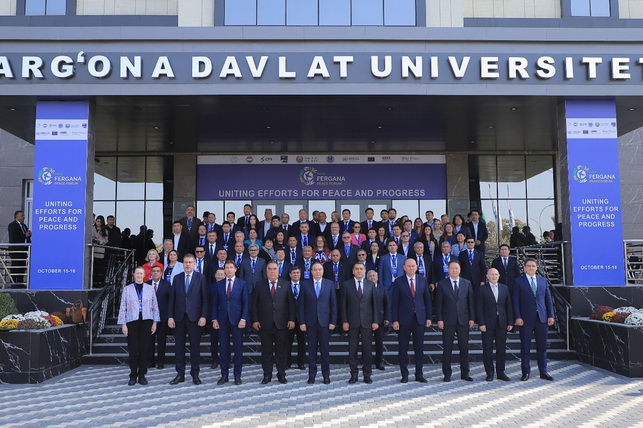
Peace and Cooperation in Central Asia: Peace Forum Launches in Ferghana
Peace and Cooperation in Central Asia: Peace Forum Launches in Ferghana
Tashkent, Uzbekistan (UzDaily.com) — On 15 October, the first International Peace Forum opened in Ferghana. Experts in peacebuilding and leading diplomats praised the long-standing tradition of harmony in Central Asia, which has become a key factor in maintaining peace in the ethnically diverse Ferghana Valley.
This extensive region, home to approximately 17 million people across Uzbekistan, Kyrgyzstan, and Tajikistan, has transformed over decades of tension into a model of successful peacebuilding. The restoration of peace and stability has largely been driven by the determined political will of the leaders of the three Central Asian states.
Eldor Aripov, Director of the Institute for Strategic and Interregional Studies under the President of Uzbekistan (ISMI), noted that the signing of the Declaration of Eternal Friendship and the Agreement on Border Junction Points in Khujand in March of this year marked an important step toward reviving the ancient tradition of peaceful coexistence.
He recalled the words of President Shavkat Mirziyoyev, delivered at the 80th anniversary session of the UN General Assembly:
“The era of closed borders, unresolved disputes, and conflicts in Central Asia is over. Today marks the beginning of the formation of a New Central Asia.”
“For decades, the Ferghana Valley was seen as a zone of complex contradictions. Today, it is becoming an example of how historical legacies of mistrust can be overcome through good-neighborliness, openness, and joint creation,” Aripov said.
“Historically, the Valley has been an open crossroads of caravans, ideas, languages, and cultures. Different peoples have coexisted here for centuries, peacefully sharing the same land, water, and sun. This historical code of mutual understanding has always helped them find balance,” he added. “Ferghana is not just a valley; it is a mirror of Central Asia. If there is peace here, it will spread throughout the region.”
The Forum is organized by ISMI in partnership with the Center for Progressive Reforms, the Organization for Security and Cooperation in Europe (OSCE), and the Peacebuilding Hub.
The event, titled “Ferghana Valley: Joining Forces for Peace and Progress,” is conducted in partnership with the National Institute of Strategic Initiatives under the President of Kyrgyzstan, the Center for Strategic Studies under the President of Tajikistan, and the Institute for the Study of Asian and European Countries of the National Academy of Sciences of Tajikistan.
The Forum received support from key international organizations, including the United Nations (UN), the Shanghai Cooperation Organization (SCO), the Conference on Interaction and Confidence-Building Measures in Asia (CICA), the Commonwealth of Independent States (CIS), and the European Union (EU). Around 300 peacebuilders and conflict resolution experts from various countries participated.
Khayrullo Bozorov, Hokim of Ferghana Region, noted that over the past nine years, cooperation between Uzbekistan, Tajikistan, and Kyrgyzstan has reached an unprecedented level. Significant progress has been made in restoring transport links, opening borders, and strengthening interstate dialogue. According to him, the successful regional cooperation experience in the Ferghana Valley can serve as a model for developing constructive relations in other parts of Central Asia.
Rajabboy Ahmadzoda, Chairman of Tajikistan’s Sughd Region, emphasized that the Ferghana Valley is not just a geographic area but a territory with rich spiritual and cultural heritage that unites the peoples of the region. He noted that Uzbekistan, Tajikistan, and Kyrgyzstan are connected not only by shared borders but also by centuries-old historical and familial ties. Ahmadzoda stated that it is the duty of the region’s countries to transform the Ferghana Valley into a space of stability, good-neighborliness, and shared future.
Aibek Shamenov, Plenipotentiary Representative of the President of Kyrgyzstan in Batken Region, highlighted the need for a joint approach to addressing key issues related to security, water resources, trade, the environment, and culture. He stressed that only through dialogue, partnership, and continuous mutual understanding can peace be established and strengthened in the region.
The opening featured welcoming remarks from Kaha Imnadze, Head of the Regional Center for Peace and Development in Central Asia, EU Special Representative for Central Asia Eduards Stiprais, OSCE Conflict Prevention Center Director Kate Fearon, Secretary-General of CICA Kairat Sarybay, and SCO Deputy Secretary-General Khan Sohail.
Leading international peacebuilding organizations, including the Berghof Foundation (Germany), the Martti Ahtisaari Peace Foundation (Finland), the PeaceNexus Foundation (Switzerland), and the Stockholm International Peace Research Institute (SIPRI), participated in discussions covering a wide range of issues, from economic opportunities to expanding the rights and capacities of women and youth amid rising climate-related risks.
The Ferghana Valley is a center for the production of the famous Uzbek ikat and silk fabrics and is an important custodian of Uzbekistan’s cultural heritage. It is also one of the most fertile areas of Central Asia, producing high yields of wheat and fruits.
On 16 October, the second day of the Forum will mark the first celebration of “Yntymak Day” (“Unity Day”), symbolizing friendship and mutual understanding among the peoples of the valley.